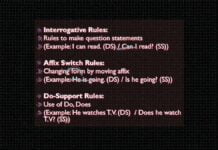An informal letter also referred to as a friendly letter, is a personal letter written to friends or relatives (Informal letter to a friend). It is written in a personal fashion. You can write it to anyone with whom you have a non-professional relationship, although this doesn’t exclude business partners or workers with whom you’re friendly either.
There are fewer formatting rules for informal letters than there are for business or formal letters. The letter can be used for some reasons like conveying messages, news, giving advice, congratulate the recipient, request information, asking questions, etc. It is a personal letter, written to whom you are familiar with, like friends, siblings, parents, or any other closed one. While writing an informal letter, one can afford to be friendly, and make use of a personal or emotional tone.
Informal Letter Format
There is no set format for an informal letter. But there is a general pattern, some conventions that people usually follow. We will be looking at this pattern and certain tips on how to write effective and attractive informal letters. These can act as guidelines when you are drafting a letter; they are not hard and fast rules.
The first thing to write is your address, i.e. the address of the writer (basically, the sender’s address). We usually write the address on the left-hand side of the page at the very top. The address should be accurate and complete. Even when writing to close friends or relatives the address must be written, so they can reply to the letter with ease. If the recipient of the letter is in another country, do not forget to write your country as well in the address.
Just below the address, we write the date. This allows the reader to have a reference as to when the informal letter was written. He can then relate better to the contents of the letter. The date, preferably, should be in expanded form.
Now since you know the person you are writing to, the greeting can be informal as well. If it is a friend or someone close to your age you can greet them by their first name, like “Dear Alex”. If you are writing to your relative like your mother/father/aunt/uncle etc, you may greet them as such, for example, “Dear Mom”. And if you are writing to an elder person, someone you respect greatly you can address them as Mr or Mrs Like say for example you were writing a congratulatory letter to your teacher, it can be addressed as “Dear Mrs Alex”.
And now we begin writing the actual letter. The introductory paragraph sets the tone for the whole letter. You might begin by asking the recipient about their well being. Or you may say that you hope the letter finds them in good health and great spirits. The opening of informal letters should be casual and comforting. It must not be formal and direct as in business letters.
Body of the Letter
The letter overall should maintain a friendly tone. But you have to adjust the language and the wordings according to who you are writing to. With a friend, you can afford to be very casual and flippant even. But if you are writing to an elder relative, you must be extremely respectful and considerate. One way to determine the tonality of your letter is to remember how you talk to the person in a conversation. And then apply the same syntax and sentiments to the letter.
In the conclusive paragraph sum up the reason for writing the letter, i.e. summarize the letter. Say a meaningful and affectionate goodbye to the reader. And do not forget to invite the reader to write back or reply to your letter. It shows an intention to keep the conversation going.
There is no one way to sign off informal letters. Since they do not follow a strict format, you may sign off as you please. Some commonly used phrases are
- Lots of Love
- Best,
- Best Wishes,
- Kind Regards,
- Kindly,
Pick the one that best suits the occasion and then simply signs your name below the greeting.
Formal Letter and Informal Letter
The formal letter is written for business or professional purposes with a specific objective in mind. It uses simple language, which is easy to read and interpret. On the contrary, informal letters are written to friends and relatives for personal communication and require a casual or emotional tone. The size of a formal letter should be concise; that does not include irrelevant matters. In contrast, the informal letter can be lengthier.
Formal letters are used for writing letters to business contacts, i.e. partners, suppliers, customers, clients, etc., college or institute, employer, professionals, etc. As against this, we write informal letters to friends, relatives, acquaintances, etc.


























